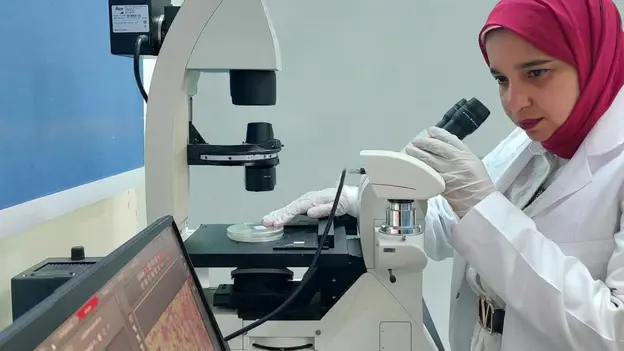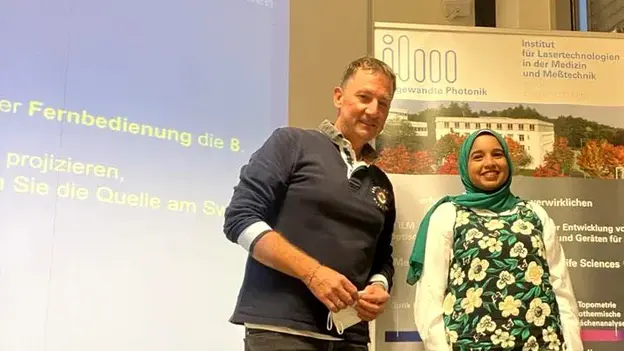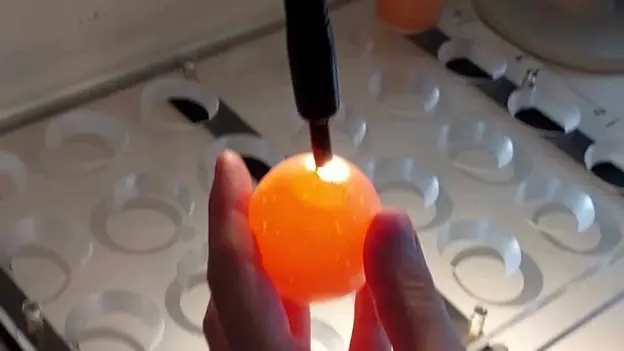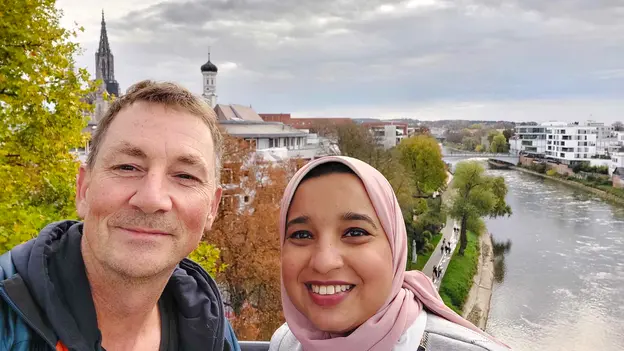Research Mobility Project
Innovative Cancer Therapy at the Molecular Level
Laboratory Work
Emphasizing that breast cancer is a global burden, AGYA member Dr. Sara Abdel Gaber used a Research Mobility Project (RMP) to investigate the possibility of using Rosuvastatin, known for its cholesterol-lowering activity, and its capacity of therapeutic assistance in anti-breast cancer therapy. To develop a nano-form of Rosuvastatin, she employed advanced nanotechnology techniques, compared different breast cancer cells and investigated the cytotoxic effects. This strategy in drug discovery, also referred to as repurposing is one of the fastest tracks to get drug approval. Abdel Gaber’s project aims at investigating the possible mechanism of action of Rosuvastatin as an anti-breast cancer agent as well as the assessment of possible treatment efficiencies using nano-formulated Rosuvastatin. A major focus lies on the relationship between this drug and the activity of the ATP (Adenosine triphosphate), which is the source of energy for use and storage at the cellular level, and mitochondria production.
Bringing together German scientists in biology with the expertise of Sara Abdelgaber in nanomedicine, the suggested project offers a highly interdisciplinary angle and is expected to provide a better understanding and assessment of the possibility for repurposing statins and nano-statins as anti-breast cancer agents.
Why did you choose to work with the Institute for Laser Technologies in Medicine and Metrology at the University of Ulm (ILM) in the framework of your AGYA Research Mobility Project?
Sara Abdel Gaber: I chose the ILM because it is one of the leading institutes in the biological assessment of drugs based on intensive simulation systems. This RMP gave me the chance to work closely within the department of medical devices headed by Prof. Dr. Alexander Hack and with a group of cellular and molecular biology headed by Dr. Rainer Wittig. Rainer Wittig has extensive experience in bio-testing, since he is a former researcher at the German Cancer Research Center (DKFZ) and project manager in oncology at R. Biopharm AG. Additionally, due to tight links to companies, the ILM offers services in terms of consultation and can transfer the developed technologies into industrial and medical practice. During my two-month research stay, I had close interactions with the research team at ILM. However, thanks to the collaboration with AGYA alumna Dr. Maha Nasr from the Ain Shams University in Egypt, who contributed to the preparatory phase by producing the nano-formulations, this project would not have turned out the way it did.
Regenerative medicine and adopting photo-activated therapies are your main research interest. What is challenging about your research?
Sara Abdel Gaber: First of all, Breast cancer is the most frequently diagnosed cancer type among females worldwide. According to the World Health Organization (WHO), in 2020, approximately 7.8 million women worldwide grappled with the challenges posed by breast cancer, leading to around 0.7 million fatalities. Although patients witness a broad spectrum of side effects, surgical and radiation therapy are the treatment of choice for controlling the disease. Consequently, there is a compelling need to discover novel formulations at molecule-scale as an effective and non-invasive anticancer therapy. Rosuvastatin is one of the hydrophilic statin derivatives and it could protect the breast cancer patients from cardiac adverse effects associated with standard chemotherapy. However, the implementation of repurposing Rosuvastatin as an anti-breast cancer agent remains uninvestigated. Moreover, the relationship between the mitochondria and ATP production process is not adequately studied either. Whether nano-formulation could exert an impact on that mechanism by altering its nature is still an open question. To address this research gap however successfully, I needed to combine my experience in pharmacology and nano-medicine with the expertise of AGYA alumna Dr. Maha Nasr in nano-formulations as well as that of the German host Rainer Wittig in molecular and cellular biology and the results are promising!
Rosuvastatin has a strong potential to combat breast cancer. Interestingly, the nanoform of Rosuvastatin performed better in all the aspects we tested.
The results we obtained are seminal! They showed that Rosuvastatin has a strong potential to combat breast cancer. Interestingly, the nano-form of Rosuvastatin performed better in all the aspects we tested. The type of cell death observed was apoptotic, which means that cell death occurs naturally in multicellular organisms and the cells stopped at the stage where they continue to grow and prepare for cell division, called G2/M phase. As a result, it indicated serious damage to the cell's DNA. In conclusion, I believe that both Rosuvastatin and its nano-form could be considered as potential treatments for breast cancer.
Did you engage in interdisciplinary encounters during your research stay?
Sara Abdel-Gaber: I did! During my stay, I participated in group meetings and periodic seminars, engaged in discussions with my colleagues about the co-supervision of future post-graduate students and planned for co-organized workshops between the ILM and my home institution. In this project, Rainer Wittig and I combined our expertise in nanomedicine, material science, and pharmaceutical technology, which was an incredible experience.
- Disciplines Involved
- Nanomedicine, Pharmacy, Materials Science
- Hosting Institution
- Institute for Laser Technologies in Medicine and Metrology at the University of Ulm (ILM)
- Project Title
- Repurposing Statin Derivatives for Breast Cancer Tumoricidal Activity
- Year
- 2023
- Funding Scheme
- Research Mobility Project
- Countries Involved
- Egypt, Germany




